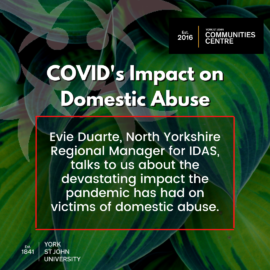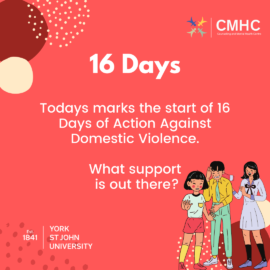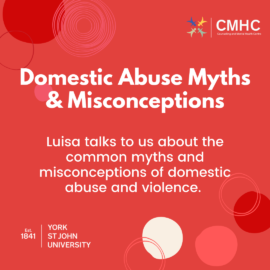Today’s post is looking specifically at violence against women and girls (VAWG).
VAWG is one of the most widespread, persistent and devastating human rights violations in our world today. It remains largely unreported due to the impunity, silence, stigma and shame surrounding it. (source: UN.org)
Not until the half of our population represented by women and girls can live free from fear, violence and everyday insecurity, can we truly say we live in a fair and equal world.” — UN Secretary-General António Guterres.
What is the 16 days of action all about I hear people say ?
16 days of Action is a global campaign which asks us all to take a stand to end violence.
Violence is something that affects everyone so why the need to look at women and girls specifically?
This is why….
- Globally, an estimated 736 million women—almost one in three—have been subjected to intimate partner violence, non-partner sexual violence, or both at least once in their life (30 per cent of women aged 15 and older). The rates of depression, anxiety disorders, unplanned pregnancies, sexually transmitted infections, and HIV are higher in women who have experienced violence compared to women who have not, as well as many other health problems that can last even after the violence has ended [1].
- Most violence against women is perpetrated by current or former husbands or intimate partners. More than 640 million women aged 15 and older have been subjected to intimate partner violence (26 per cent of women aged 15 and older) [1].
- Of those who have been in a relationship, almost one in four adolescent girls aged 15 to 19 (24 per cent) have experienced physical and/or sexual violence from an intimate partner or husband. Sixteen per cent of young women aged 15 to 24 experienced this violence in the past 12 months [1].
- In 2018, an estimated one in seven women had experienced physical and/or sexual violence from an intimate partner or husband in the past 12 months (13 per cent of women aged 15 to 49). These numbers do not reflect the impact of the COVID-19 pandemic, which has increased risk factors for violence against women [1].
- Calls to helplines have increased five-fold in some countries as rates of reported intimate partner violence increase because of the COVID-19 pandemic. Restricted movement, social isolation, and economic insecurity are increasing women’s vulnerability to violence in the home around the world [2].
- By September 2020, 52 countries had integrated prevention and response to violence against women and girls into COVID-19 response plans, and 121 countries had adopted measures to strengthen services for women survivors of violence during the global crisis, but more efforts are urgently needed [3].
- Globally, 6 per cent of women report they have been subjected to sexual violence from someone other than their husband or partner. However, the true prevalence of non-partner sexual violence is likely to be much higher, considering the particular stigma related to this form of violence [1].
- One hundred thirty-seven women are killed by a member of their family every day. It is estimated that of the 87,000 women who were intentionally killed in 2017 globally, more than half (50,000) were killed by intimate partners or family members. More than one third (30,000) of the women intentionally killed in 2017 were killed by their current or former intimate partner [4].
- Fewer than 40 per cent of the women who experience violence seek help of any sort. In the majority of countries with available data on this issue, among women who do seek help, most look to family and friends, and very few look to formal institutions, such as police and health services. Fewer than 10 per cent of those seeking help appealed to the police [5].
- Globally, violence against women disproportionately affects low- and lower-middle-income countries and regions. Thirty-seven per cent of women aged 15 to 49 living in countries classified by the Sustainable Development Goals as “least developed” have been subject to physical and/or sexual intimate partner violence in their life. Twenty-two per cent of women living in “least developed countries” have been subjected to intimate partner violence in the past 12 months—substantially higher than the world average of 13 per cent [1].
- At least 155 countries have passed laws on domestic violence, and 140 have laws on sexual harassment in the workplace. However, even when laws exist, this does not mean they are always compliant with international standards and recommendations, or that the laws are implemented and enforced [6].
- Adult women account for nearly half (49 per cent) of all human trafficking victims detected globally. Women and girls together account for 72 per cent, with girls representing more than three out of every four child trafficking victims. Most women and girls are trafficked for the purpose of sexual exploitation [7].
- In 2019, one in five women, aged 20–24 years, were married before the age of 18. During the past decade, the global rate of child marriage has declined, with South Asia having the largest decline during this time. Today, the risk of child marriage is highest in sub-Saharan Africa, where more than one in three women, aged 20–24 years, were married before the age of 18. Child marriage often results in early pregnancy and social isolation, interrupts schooling, and increases a girl’s risk of experiencing domestic violence [8].
- At least 200 million women and girls, aged 15–49 years, have undergone female genital mutilation in 31 countries where the practice is concentrated. Half of these countries are in West Africa. There are still countries where female genital mutilation is almost universal, where at least 9 in 10 girls and women, aged 15–49 years, have been cut [9].
- 15 million adolescent girls worldwide, aged 15–19 years, have experienced forced sex. In the vast majority of countries, adolescent girls are most at risk of forced sex (forced sexual intercourse or other sexual acts) by a current or former husband, partner, or boyfriend. Based on data from 30 countries, only one per cent have ever sought professional help [10].
- School-related gender-based violence is a major obstacle to universal schooling and the right to education for girls. Globally, one in three students, aged 11–15, have been bullied by their peers at school at least once in the past month, with girls and boys equally likely to experience bullying.
- While boys are more likely to experience physical bullying than girls, girls are more likely to experience psychological bullying, and they report being made fun of because of how their face or body looks more frequently than boys [11].
- One in 10 women in the European Union report having experienced cyber-harassment since the age of 15. This included having received unwanted and/or offensive sexually explicit emails or SMS messages, or offensive and/or inappropriate advances on social networking sites. The risk is highest among young women aged 18–29 years [12].
- In the Middle East and North Africa, 40–60 per cent of women have experienced street-based sexual harassment. In the multi-country study, women said the harassment was mainly sexual comments, stalking or following, or staring or ogling. Between 31 and 64 per cent of men said they had carried out such acts. Younger men, men with more education, and men who experienced violence as children were more likely to engage in street sexual harassment [13].
- Across five regions, 82 per cent of women parliamentarians reported having experienced some form of psychological violence while serving their terms. This included remarks, gestures, and images of a sexist or humiliating sexual nature, threats, and mobbing. Women cited social media as the main channel of this type of violence, and nearly half (44 per cent) reported receiving death, rape, assault, or abduction threats towards them or their families. Sixty-five per cent had been subjected to sexist remarks, primarily by male colleagues in parliament [14].
~
Author: Luisa
~
Support Available:
- IDAS | 03000 110 110
- Survive | 0808 145 1887
- Respect – Men’s Advice Line | 0808 8010327
- ManKind Initiative | 01823 334244
- Survivors UK | Chat via SMS text 020 3322 1860
- Victim Support | 08 08 16 89 111
- Refuge | 0808 2000 247
- SupportLine | 01708 765200
- The National Domestic Abuse Helpline | 0808 2000 247
- If you are in immediate danger, call 999 and ask for the police.
- If you are concerned that you or someone you know may be an abuser, there is support available. The Respect Phoneline is an anonymous and confidential helpline for men and women who are harming their partners and families: 0808 802 4040.
References:
Facts and figures: Ending violence against women | What we do | UN Women



